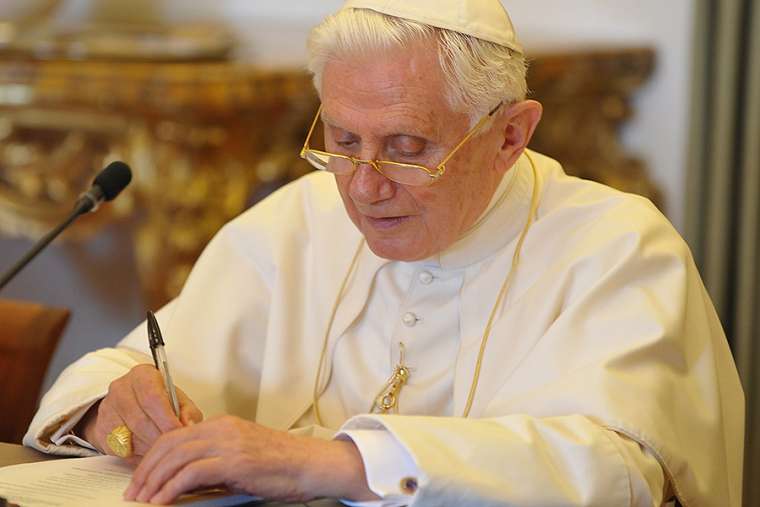- Pope Emeritus Benedict XVI sent a message to the International Theological Commission this week reflecting on the theological contributions of the commission that he led for nearly half of its 50-year history.
“Only humility can find the Truth, and the Truth in turn is the foundation of Love, from which ultimately everything depends,” Benedict XVI wrote in a message read aloud to the International Theological Commission.
The pope emeritus expressed “gratitude for what has been accomplished in half a century” by the theological commission, “even with all the inadequacies of the human search.”
Benedict XVI, then Joseph Ratzinger, served as president of the International Theological Commission from 1982-2005 as prefect of the Congregation of the Doctrine of Faith under St. John Paul II.
St. Paul VI appointed Ratzinger as a member of the first International Theological Commission in 1969, along with Henri de Lubac, Karl Rahner, Yves Congar, Hans Urs von Balthasar, and 25 others.
In his message for an event at the Pontifical Lateran University Nov. 28 on the 50th anniversary of the Founding of the Commission, the pope emeritus reflected on the theologians who had been his collaborators on the first commission.
“Apart from Hans Urs von Balthasar, it was above all Louis Bouyer, who as a convert and a monk, had an extremely stubborn personality, and because of his careless frankness was not liked by many bishops, but he was a great collaborator with an incredible vastness of knowledge,” Benedict wrote.
He also recalled Fr. Marie-Joseph Le Guillou working entire nights during the Synod of Bishops before Parkison’s disease prematurely ended his theological career, and the conflict over whether the Catholic Church should be a member of the World Council of Churches in Geneva, which ultimately led Rahner and Johannes Feiner to leave the commission.
“Alongside the questions concerning the relationship between the Magisterium of the Church and the teaching of theology, one of the main areas of work of the theological commission has always been the problem of moral theology,” Benedict wrote.
“The International Theological Commission, despite all efforts, was unable to achieve a moral unity of theology and theologians in the world. Those who expected this had wrong expectations about the possibilities of such work,” he said.
The pope emeritus wrote that despite this, the commission has become a voice that is listened to today, and this therefore indicates a basic understanding that “serious theological effort must follow in this historic moment.”
Thirty members of the International Theological Commission are appointed by the pope every five years. In the 2014-2019 term, the commission published two documents: Synodality in the Life and Mission of the Church and Religious Freedom for the Common Good.
In a meeting with the International Theological Commission Nov. 29, Pope Francis stressed the importance of theologians working together.
“We don't do theology as individuals, but in the community, at the service of all,” Francis said. He added that “synodality is an ecclesial journey that has a soul that is the Holy Spirit,” saying, “Without the Holy Spirit, there is no synodality.”
Benedict XVI’s message, dated Oct. 22, also encouraged the commission to “fundamentally continue in the effort to seek a consensus.”
“As for me personally, work in the International Theological Commission has given me the joy of meeting other languages and forms of thought. Above all, however, it has been for me a continuous occasion of humility, which sees the limits of what is proper to us and thus opens the way to the greatest Truth,” Benedict XVI said.

